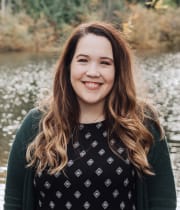Mary Bridge program helps children cope with the loss of a loved one

By Kortney Scroger
In 2004, Taylor Avalos and her family were changed forever. A tragic accident took the lives of her father, Jeff, and her 8-year-old cousin, Joey.
“I just couldn’t believe it,” she recalls. “Those days after, I kept expecting my dad to pull into the driveway after work like he always did. The changes that come after losing someone have a domino effect, impacting everything that happens in your life after that.”
Avalos, now in her 20s, was 10 years old at the time, and her sister was a teenager. To help process the devastating loss, their mother brought them to Mary Bridge Children’s Bridges Center for Grieving Children, where they met other kids going through similar situations.
Bridges is one of the only bereavement programs available for children in the Pacific Northwest. It is open to families with children ages 4-18, at no cost.
“Being a young child losing a parent, there are not many kids who are going through the same thing you are,” Avalos explains. “You feel so different. I think that’s what’s really appealing about Bridges — the normalcy.”
One of Avalos’s favorite memories of the program was during a support group that focused on memorialization. She created a box of clay sculptures representing the things her father loved to do. Avalos continues to cherish that memory box and the skills she learned through Bridges all those years ago.
“I’ve seen the impacts of not dealing with grief properly in my own family,” Avalos says. “I don’t want to know what would’ve happened if I hadn’t learned what I did at Bridges coming from someone who’s been through the program — it matters.”
It mattered to Avalos so much, in fact, that she returned to Bridges over a decade after her father’s death to volunteer as a group facilitator for the parent loss support group. This is where she met Colette August, who also attended the program as a child and returned to volunteer.
“What I remember from the program is that it was a positive place,” August says. “I wanted to give back because I know how important it is for kids to have these tools at an early age.”
Because it’s no cost to families, Bridges relies heavily on volunteer support and the donations from the community to provide these tools and services.
“With only three staff members, there is no way we could serve all the families we do without our volunteers,” says Amy VanZandt, Bridges Family Support Coordinator. “To facilitate, you don’t need experts, but rather compassionate people with big hearts who want to make a difference in the lives of grieving children and adults.”
This year marks three decades of Bridges supporting children such as Avalos and August. Since 1989, Bridges has served nearly 7,000 children from more than 4,200 families, helping them process, cope and heal through bimonthly peer support groups.
Each support group begins with a family dinner followed by peer groups for parents and children segmented by age and type of loss. In these sessions, facilitated by trained volunteers, participants talk about the person who died and express their feelings through activities and crafts that align with different themes, including healthy coping mechanisms, memorialization and sharing.
“Programs like Bridges are an integral part of the fabric of a community that cares,” says Bridges Family Support Coordinator Darren Wenz. “Death is uncomfortable for communities to talk about. We found a way to gently help families identify, talk about and heal from what many think of as a devastating loss.”
In the United States, one in 20 children will experience the death of a parent or sibling before the age of 15. These children are at a much higher risk than their peers for depression, suicide, poverty and substance use disorder.
Because unacknowledged grief is more harmful than grief that is identified, shared and supported, Bridges groups have been proven to prevent academic struggles, isolation from peers and long-term depression or anxiety.
“Being able to provide this kind of support for our kids can make a big impact on them becoming healthy adults,” August says.
Death and grief are universal human experiences; it’s how you’re supported through those experiences that makes the difference.
“It’s hard to see what your life is going to look like when you are going through grief,” Avalos says. “All you can see is the bad. I wish my dad was still here, but I am thankful for Bridges and how my life is today. Because of that experience, I know to cherish every moment, to hug my family a little tighter, and to put others before myself. Just like my dad did.”
Become a Bridges volunteer or make a donation




